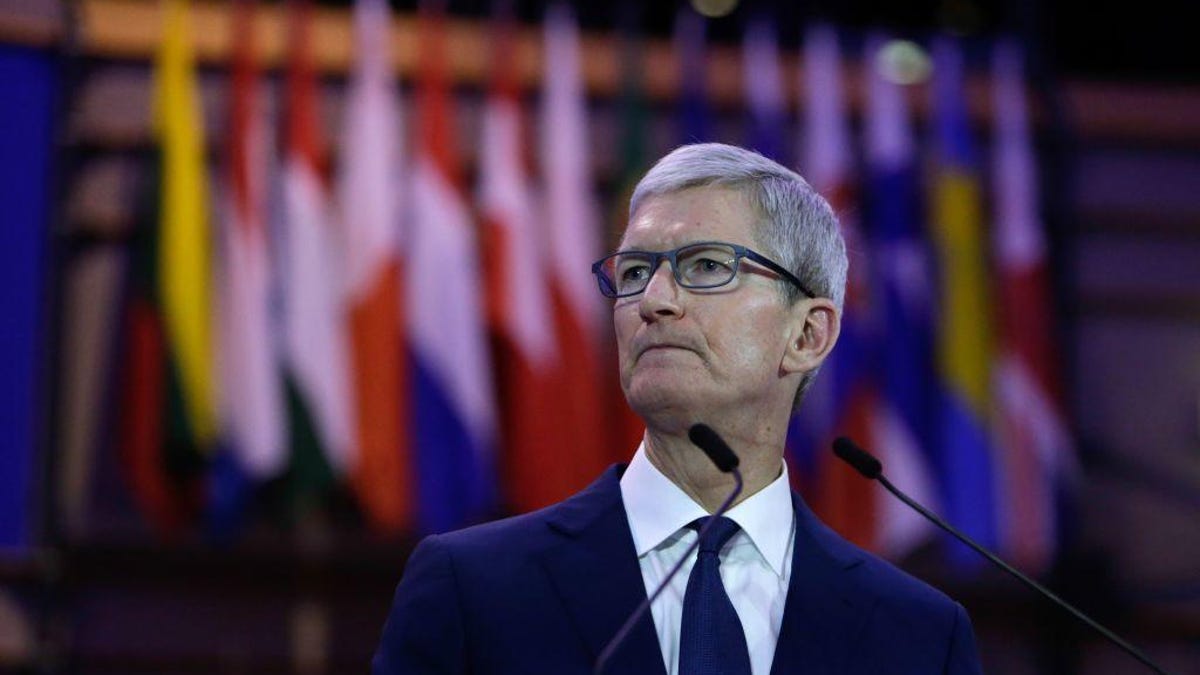Apple CEO Tim Cook: Bring on a US data privacy law
Cook hits out at social media companies that suck up customer data. "This is surveillance," he says.

Tim Cook, CEO of Apple, at the European Parliament on Wednesday.
Apple CEO Tim Cook made a passionate speech about data privacy at the European Parliament on Wednesday, in which he said he supports a "comprehensive federal data privacy law" in the US.
Cook praised the effective data privacy regulation enforced in the EU and other countries around the world. "It is up to us, including my home country, to follow your lead," he said.
He was speaking in Brussels at the International Conference of Data Protection and Privacy Commissioners during a trip to Europe, where he also spent time in France. He used the opportunity to speak about Apple's longstanding commitment to privacy and to call for changes to the law in the US that mimic the EU's strict new privacy regulations, known as GDPR, that went into effect in May.
Members of Congress have shown interest in moving toward a federal law governing consumer privacy. In testimony last month, representatives of Apple and of other tech companies, including AT&T, Amazon, Google and Twitter, told lawmakers how they collect data and how regulation, if it comes to that, should play out.
Apple has taken high-profile actions in support of user privacy. In 2016, for instance, it refused to alter its software so that the FBI could access an iPhone 5C tied to the San Bernardino terrorist incident, arguing that the change would create a back door to all other iPhones . In June of this year, it unveiled features for its Safari browser that could disable tracking tools Facebook and Twitter use to keep tabs on people's browsing habits.
Cook outlined how he imagined a data privacy law in the US taking shape, with four key points:
- Minimizing and anonymizing all data collected.
- Full transparency that gives users a clear picture about what data is being collected. "Anything less is sham," he said.
- Giving users the right to access, edit and delete that data.
- Giving them the right to have data stored securely.
"We at Apple believe privacy is a fundamental human right but we also recognize that not everyone sees it that way," said Cook. He spoke of how rogue actors and even governments can undermine people's sense of what's true and what's false.
"This crisis is real. It is not imagined or exaggerated or crazy," he said.
Without naming names, he also appeared to hit out at large social media companies and their endless data-gathering operations. The large amount of data collected, he said, serves only to enrich the companies that collect it.
"Our own information, from the everyday to the deeply personal, is being weaponized against us every day." said Cook. "We shouldn't sugarcoat the consequences -- this is surveillance. This should make us very uncomfortable, it should unsettle us."
He suggested that some large companies endorse privacy reforms in public, but then resist change behind closed doors. Cook also pre-empted arguments that regulation stifles innovation, saying technology will never reach its full potential without the full faith and confidence of those who use it.
Both Google CEO Sundar Pichai and Facebook CEO Mark Zuckerberg are due to address the conference via video message on Wednesday afternoon.
Cook also touched on his own preoccupation with AI, saying that it's vital that the emerging technology is designed with human values, including privacy, at its heart. "If we get this wrong, the dangers are profound," he said.
He acknowledged the role that the iPhone played in putting huge amounts of data on the internet and in people's pockets, and said that he takes the responsibility seriously.
There's long been pressure on Apple to bend its values and share information, but the company refuses to trade the "precious cargo" that is customer data, he said. "We're not willing to leave our users to fend for themselves, and we've shown we will defend them, we will defend our principles when challenged."
Security: Stay up-to-date on the latest in breaches, hacks, fixes and all those cybersecurity issues that keep you up at night.
Apple now has a privacy portal: It lets US customers download their data

